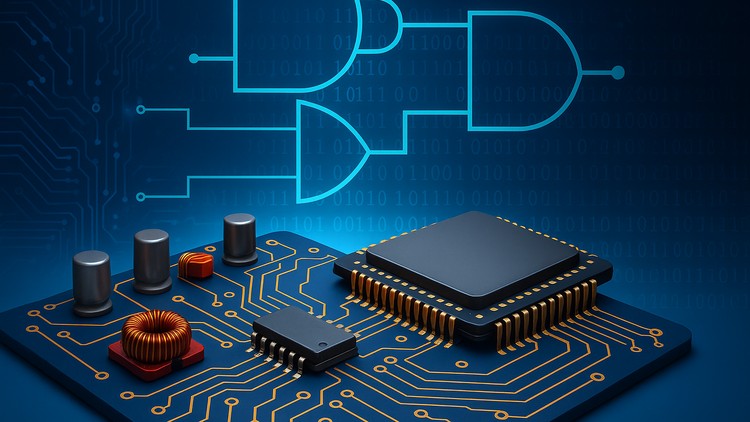
Master core computer science with electronics, C++, logic circuits & data structures—taught by real university professor
⏱️ Length: 14.4 total hours
⭐ 4.21/5 rating
👥 10,734 students
🔄 May 2025 update
Add-On Information:
Note➛ Make sure your 𝐔𝐝𝐞𝐦𝐲 cart has only this course you're going to enroll it now, Remove all other courses from the 𝐔𝐝𝐞𝐦𝐲 cart before Enrolling!
-
Course Overview
- Delve into the fundamental architecture of modern computing, uncovering the intricate dance between hardware components and software instructions that power every digital interaction.
- Bridge the critical gap between high-level programming abstractions and the tangible electronic impulses that drive computational processes, fostering a holistic understanding of system operations.
- Explore the foundational principles that underpin all computer science and engineering disciplines, from the silicon logic gates to the sophisticated data manipulation within memory.
- Gain insights into the historical evolution and contemporary relevance of low-level concepts, crucial for navigating the complexities of operating systems, embedded systems, and advanced hardware design.
- Understand the “how” and “why” behind computer behavior, equipping you with the analytical toolkit to diagnose performance bottlenecks and optimize resource utilization at the deepest levels.
-
Requirements / Prerequisites
- A foundational curiosity about how computers function beyond the graphical user interface, coupled with a drive to explore their inner workings.
- Basic computer literacy, including navigating file systems, installing software, and a general comfort with digital environments.
- While no prior programming expertise is strictly required, a logical mindset and problem-solving aptitude will significantly enhance your learning experience.
- Access to a personal computer (Windows, macOS, or Linux) capable of running a C++ compiler and potentially a simple text editor or Integrated Development Environment (IDE).
- No advanced mathematical background is necessary; however, an ability to engage with abstract concepts and logical reasoning will be beneficial.
-
Skills Covered / Tools Used
- Develop a profound intuition for machine-level execution flows, interpreting how high-level code translates into processor-understandable instructions.
- Acquire systematic debugging strategies applicable to complex hardware-software interactions, enabling you to pinpoint issues across multiple abstraction layers.
- Master the craft of writing high-performance, resource-efficient C++ code by understanding its direct impact on processor cycles and memory footprints.
- Gain practical experience with common C++ development environments and tools, fostering a professional workflow for software engineering tasks.
- Grasp the architectural implications of various data structures on system performance, learning to select and implement them for optimal algorithmic efficiency.
- Cultivate an engineering mindset for digital design, appreciating the trade-offs between speed, power, and area in fundamental circuit implementations.
- Familiarize yourself with the operational principles of semiconductor devices, crucial for understanding the physical limits and capabilities of modern microprocessors.
- Learn to conceptualize and model computational problems in a way that respects the underlying hardware, leading to more robust and scalable solutions.
- Utilize standard C++ compilers (like GCC, Clang, or MSVC) and potentially basic logic gate simulation tools to reinforce theoretical knowledge with practical application.
-
Benefits / Outcomes
- Build an unshakable core understanding that serves as the bedrock for advanced studies in operating systems, compilers, computer architecture, and embedded systems.
- Become a more effective and insightful programmer, capable of writing optimized code and troubleshooting complex bugs that baffle those without low-level knowledge.
- Develop a unique competitive edge in the job market, demonstrating a rare and highly valued comprehension of the entire computing stack, from silicon to software.
- Unlock the ability to critically evaluate and contribute to discussions on emerging technologies like quantum computing or specialized hardware accelerators, armed with foundational principles.
- Gain confidence in reverse-engineering computational problems, breaking them down into their most atomic components for creative and efficient solutions.
- Empower yourself to embark on projects involving custom hardware interfaces, firmware development, or high-performance computing optimizations.
- Receive an educational experience grounded in real university-level teaching methodologies, ensuring depth, rigor, and academic integrity.
-
PROS
- Comprehensive Foundation: Offers a holistic journey from basic electronics to sophisticated data structures, covering essential computer science fundamentals.
- Expert Instruction: Taught by a university professor, ensuring high-quality, academically rigorous content and pedagogical approaches.
- Practical Relevance: Directly applicable skills for optimizing code, understanding system performance, and building robust software/hardware interfaces.
- Strong Community: A large student base (10,734+) indicates a vibrant learning environment and potential for peer interaction.
-
CONS
- Steep Learning Curve: The inherent complexity of low-level concepts demands dedicated effort and persistent engagement.
Learning Tracks: English,IT & Software,Other IT & Software
Found It Free? Share It Fast!